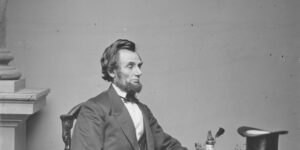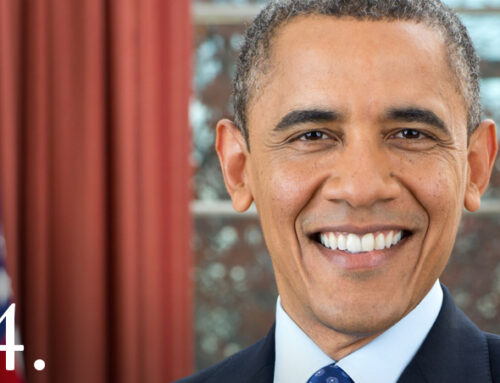Abraham Lincoln was the 16th President of the United States, serving from March 1861 until his assassination in April 1865. He is best known for his role in leading the country through its Civil War and for his efforts to abolish slavery.
Lincoln was born in Kentucky in 1809 and grew up in a poor family. Despite having a limited formal education, he was a voracious reader and self-taught many subjects. He became a lawyer and later entered politics, serving in the Illinois state legislature and the United States House of Representatives.
In 1860, Lincoln was elected President of the United States as a member of the Republican Party. At the time, the country was deeply divided over the issue of slavery, and Lincoln’s election was met with resistance from Southern states. In 1861, several Southern states declared their secession from the Union, leading to the Civil War.
As President, Lincoln faced many challenges and made many difficult decisions. He issued the Emancipation Proclamation, which declared that all slaves in Confederate states were free, and he worked to keep the Union together and defeat the Confederacy. In 1865, the Civil War ended with the Union’s victory and the abolition of slavery. However, just a few weeks later, Lincoln was assassinated by a Confederate sympathizer.
Despite his short time in office, Lincoln is remembered as one of the greatest Presidents in American history. His leadership and determination during the Civil War helped to preserve the Union and end slavery, and his legacy continues to inspire people around the world.
So what are the things you can learn From the man, the myth, the one, and the only Abraham lincoln?
Do you have financial advisors? I wrote many posts about this topic Like Questions to ask a Financial Adviser. Financial Advisor: Theory vs Reality How to pick a financial advisor? and many more.
The reason I am asking is that the 16th president of the United States of America whose accomplishments ranged from abolishing slavery, strengthening the federal government, and revolutionizing the economy, didn’t find it wrong or embarrassing to consult advisors. During his time in office, Lincoln often consulted with his advisers when making key decisions. He would purposely seek out individuals whose opinions differed from his own.
If I didn’t mention extensively about civil war, it will not be right.
Lincoln was also frugal with public money, becoming angry when his wife, Mary Todd Lincoln, blew her budget by almost $7,000 while refurbishing the White House — after Congress had already allotted $20,000 for her to use. He recognized that it was unseemly for Mrs. Lincoln to spend $20,000, much less $27,000, on furnishings and upgrades when Union soldiers were going without blankets.
The importance of being careful with one’s money is a timeless lesson, but it’s worth noting that Lincoln maintained frugality throughout his lifetime, even after he no longer needed to be cognizant of every penny spent. From Lincoln’s example, modern Americans can learn that being frugal, even after one’s financial situation improves, is a smart way to handle money.
Entering office at the dawn of the Civil War, President Abraham Lincoln faced tremendous challenges. Everything about the war was contentious including finding the means to finance it. In addition to raising $3 billion to fight the Confederacy, Lincoln and his Treasury Secretary, Salmon P. Chase, had the added challenge of financing the war in a way that was perceived equitable across the polarized nation. They also lacked a stable financial infrastructure without a central bank, a national banking system, a national currency, or a means for collecting internal federal taxes.
Lincoln and Chase’s financial legacy was tremendous, as they created innovative ways to collect federal revenues that are still used today. New taxes, such as the first income and inheritance tax, were introduced in the war years, along with new excise taxes. Also, for the first time since the Revolution, the federal government printed its own money, called greenbacks, and took the first steps towards creating a national regulation system for banks. Bond drives were organized to sell securities to laypeople and immigrants to raise money for the war while uniting the Union states. By the war’s end, the Union raised about two-thirds of its money through loans, and about a quarter by increasing tariffs and taxes. While justifying his tax policy, He said “Each man Shall pay taxes in exact proportion to the value of his Property.” Yes, President Lincoln said it.
In all this, what did I learn? innovation. Some of your problems are maybe new. there is no need to search for their answer in past. Some of your ways maybe give new answers to your situation. Greenbacks may not be alive today but that was the start of something. The Founding fathers made some great things but it was clear that with time, some new things some new questions came and they need answers. This may be the situation in your life also. So there is no shame in taking advice from someone else. Abraham Lincoln was one of the most controversial leaders of his time and was well-known for seeking out the opinions of those who disagreed with him. Lincoln’s first presidential Cabinet included two of his rivals for the 1860 presidential nomination. Here I Literally can’t stop myself from mentioning Barack Obama, Joe Biden, and Kamala Harris. When deciding his running mate or VP nominee, Barack Obama chooses Joe Biden. Some people were shocked. But when he explains why people realize that Barack Obama was one fine person who knows and cares about people who keep different views them his. So when It came to Joe Biden, His choice was Kamala Harris. Obama said joe hit the bull eye.
Surrounding yourself with people who are inclined to agree with you could leave you without a full perspective of your financial picture. By getting advice and perspectives from multiple sources—online blogs, articles, and message boards; trusted financial mentors; family members and loved ones; and, above all, a financial professional—you have a broader view of the issues facing you and may be able to formulate some outside-the-box solutions.
Not only Jefferson, but also lincoln faced something called debt, which is not their problem. As a young man, Abraham Lincoln decided to foray into the grocery business in New Salem, Illinois, in 1830, with a partner named William F. Berry. After Berry died, Lincoln was left with a stack of bills so large that the future president called it “The National Debt.” So definitely debt is beyond doubt something we need to think about. Even presidents of the US can’t handle it so we need to be cautious and take the advice of advisors.
Saving money beyond doubt is an important part of your financial habits. But how much that can help you? Once again, the Life lessons of Abraham Lincoln help you to understand it. Abraham Lincoln’s impoverished childhood in a log cabin not only adds to the heroic patina of his life’s story but also helps to explain our 16th president’s lifelong frugality. Lincoln saved much of the $25,000 annual salary he made as president. According to author Harry E. Pratt, “[Lincoln’s] estate grew from $15,000 in 1861 to more than $85,000 at his death. The increment came principally from his $25,000 yearly salary as president.”





